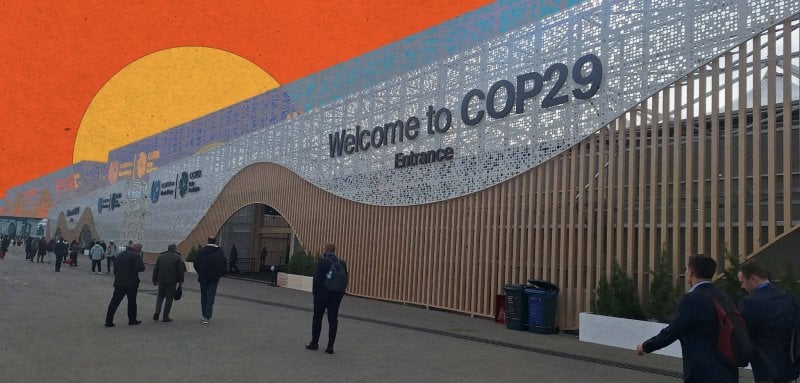‘The Finance Summit’ is echoing through every corridor at the COP29 Climate Conference. Trillions of dollars are being discussed and allocated for funding projects aimed at mitigating and adapting to the devastating effects of climate change worldwide. The atmosphere feels like a mad scramble for the largest piece of the pie.
For days, I wandered through the vast halls and pavilions inside the conference, staged in and around Baku Olympic Stadium. The number “one trillion dollars” seemed to appear everywhere. Negotiators from all over the world, experts, and activists with colorful lanyards reading “Pay the Trillions” participated in around-the-clock sessions, events, and conferences.
To many, this year feels decisive.
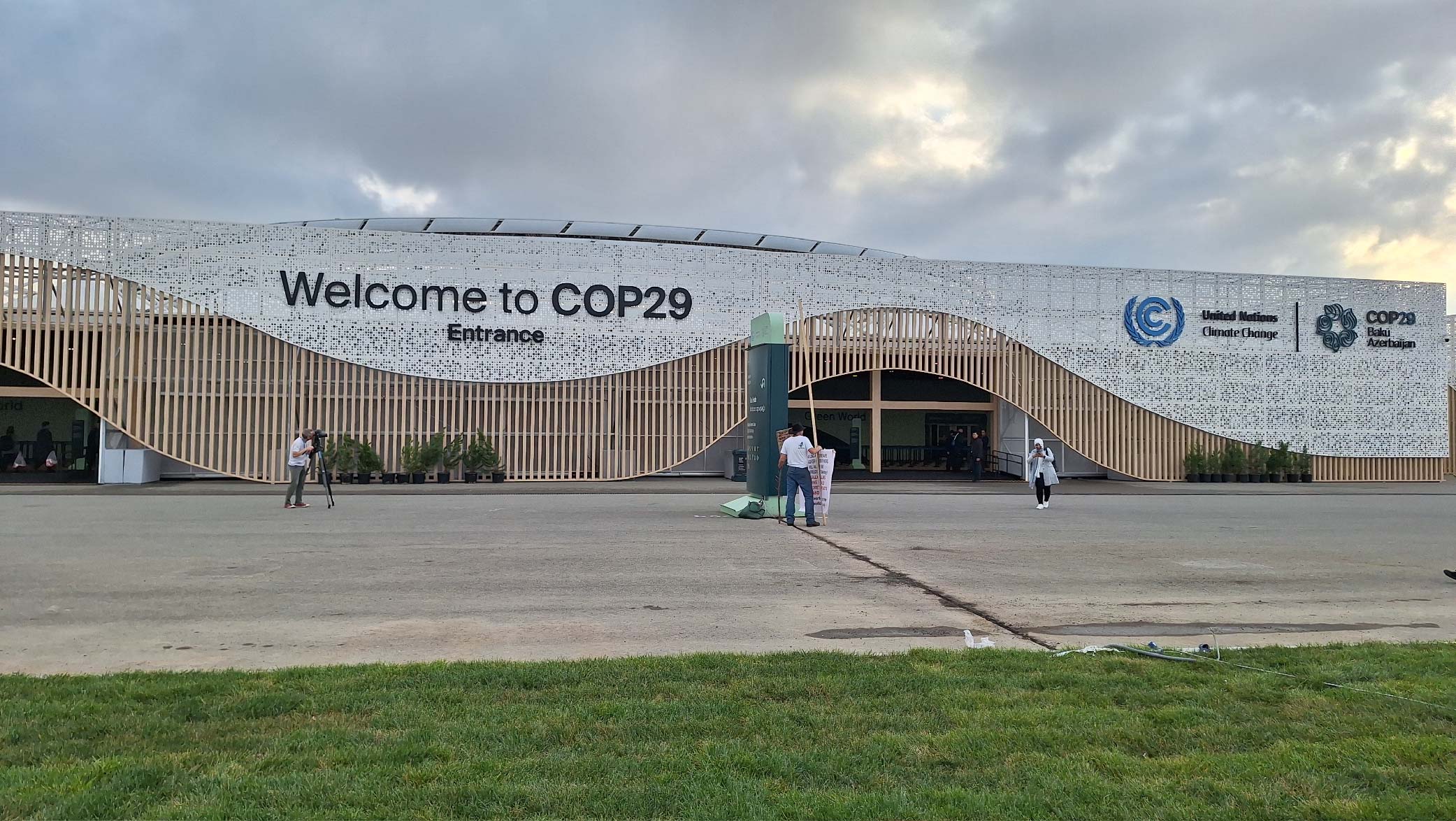 COP29 UN climate summit main entrance
COP29 UN climate summit main entrance
Trillions of dollars are being discussed and allocated for funding projects aimed at mitigating and adapting to the devastating effects of climate change worldwide. The atmosphere feels like a mad scramble for the largest piece of the pie. Will Arab countries have a share?
As I watched this frantic race for funding, I couldn’t help but wonder: where does the Arab region—plagued by decades of conflict and endless wars that have devastated vast parts of its infrastructure and deeply impacted by the devastating consequences of climate change—stand in these discussions, negotiations, and funding? Are we receiving what we truly need? And, if not, where does the gap lie?
A trillion dollars annually but a ‘negligible’ share for the Arabs
In 2009, during the COP15 summit in Copenhagen, a climate financing goal was set: wealthy and highly polluting nations were to contribute $100 billion annually to assist the most vulnerable countries. The aim was to mitigate the impacts of climate change, enhance their ability to cope with its devastating effects across various sectors, and transition toward lower emissions. However, this target lacked a clear framework for collecting and distributing this amount. Some argue that the figure was “randomly proposed by certain negotiating delegations and simply approved—just like that.”
Today, fifteen years later, the COP29 summit convened to establish a new, far more ambitious target, along with a commitment to collect and disburse it—dubbed the “New Collective Quantified Goal.” Proposals are converging on raising $1 trillion annually over the next five years—a figure described as “extremely ambitious.” Yet experts warn this figure still falls short of actual needs. The UN Framework Convention on Climate Change (UNFCCC) estimates a required $5.8 to $5.9 trillion by 2030, based on national plans for emissions reduction and climate adaptation. However, the UN figure doesn’t fully account for unmet or actual needs, as many nations lack the resources or expertise to draft comprehensive plans.
At the same time, several organizations, activists, and experts are calling for $5 trillion annually—not only to fund climate action but also to address related debts that have accumulated as climate financing was previously offered as a loan rather than a grant, a model widely criticized for being deeply unjust. Experts have proposed several innovative methods to raise these amounts, emphasizing that it should not rely solely on state contributions. Examples include imposing taxes on environmentally harmful activities, plastic production, and cryptocurrency operations, as well as levies on the world’s wealthiest individuals.
During the first week of COP29, dozens of press conferences, events, and sessions focused on the topic of financing. Participants agreed that this is not charity or aid, but rather a “commitment.” They stressed that the obstacle toward a new goal is not a lack of funds at the state level but the lack of intention to move forward with this commitment. While billions, for instance, are spent annually on militarization, there is insufficient attention given to combating the impacts and consequences of climate change, and climate-related disasters that cross borders remain underfunded. Delegates often come to negotiation tables with “empty-pockets,” despite the clear global need. Although some funds were raised, this year’s negotiations have been described by many as “slower than usual.”
One week into the summit, discussions were still ongoing to determine the final figure, who will pay, and how.
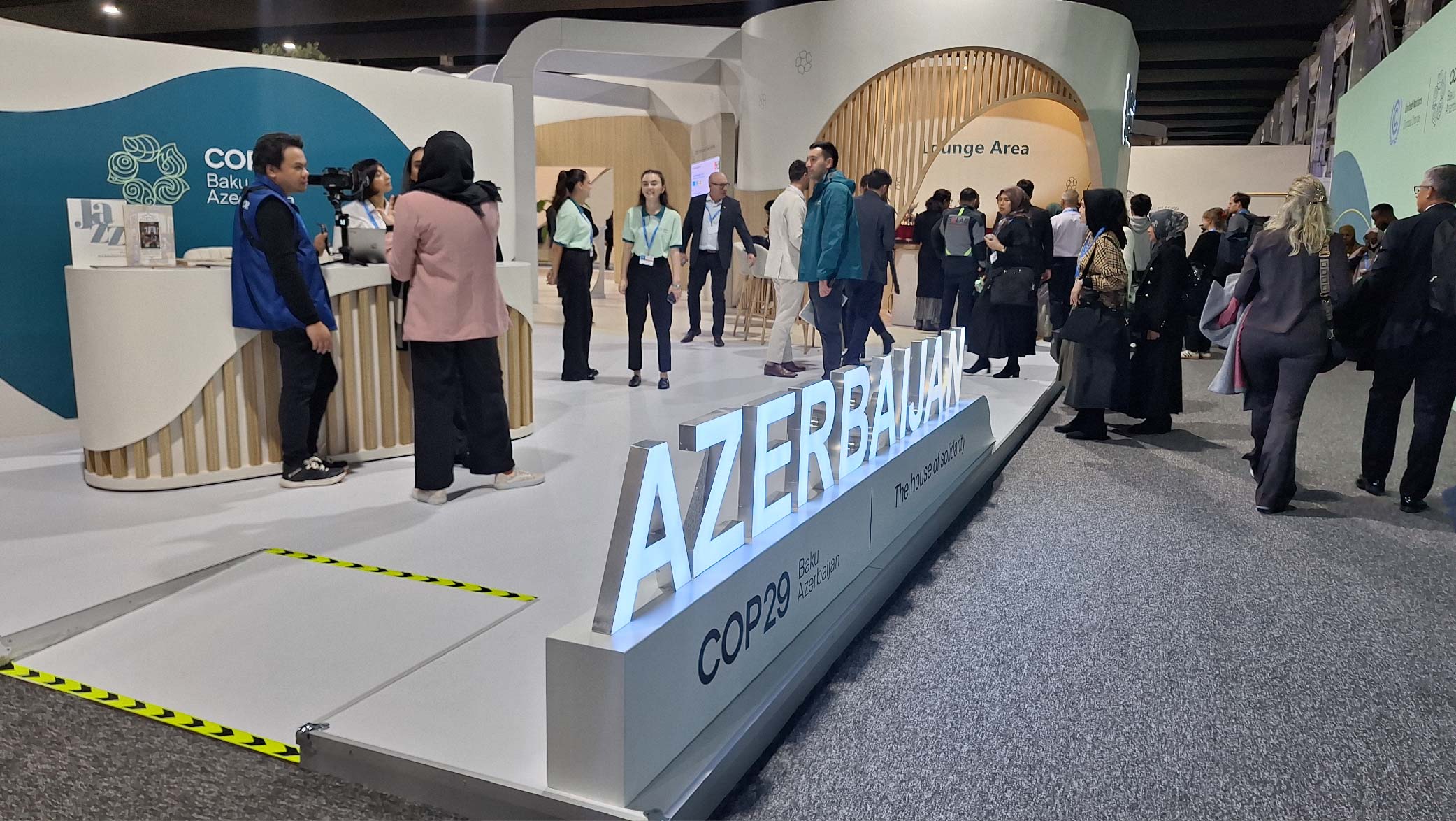 Climate financing at COP29 Climate financing at COP29 in Azerbaijan Baku
Climate financing at COP29 Climate financing at COP29 in Azerbaijan Baku
The climate financing received by some Arab countries over the past decade amounted to no more than 6% of their actual needs, according to a 2022 report by the UN ESCWA committee. Approximately 85% of this financing were loans, further burdening countries already struggling with unprecedented debt levels. By 2020, the total debt in the Arab region had reached approximately $1.5 trillion. Additionally, most of the funding does not flow from designated climate finance funds due to their stringent and often nearly impossible conditions for obtaining them. These funds are also inflexible and poorly suited to the diverse circumstances of the region, where some countries face fierce conflicts while others endure the strain of Western sanctions.
A 2022 report by the UN ESCWA committee highlights that the climate financing received by some Arab countries over the past decade amounted to no more than 6% of their actual needs. Approximately 85% of this financing were loans rather than grants, further burdening countries already struggling with unprecedented debt levels.
An “unjust” path
Amid the intense negotiations and side events, Raseef22 spoke with Musaed Aklan, a member of Yemen’s negotiating delegation and a senior researcher at the Sana’a Center for Strategic Studies. He described the climate financing mechanisms at the ongoing climate summit as “slow and utterly unjust.”
“There is extraordinary resistance from industrialized countries during negotiations and when it comes to fulfilling their commitments,” said Aklan. “Financing mechanisms fail to account for the unique situations of individual countries.
“For example, some nations that are not significantly affected by climate change receive far greater funding—up to 8,000% more—than those heavily impacted. The allocation often depends on the stability of countries, their ability to submit proposals and projects, and their efficiency in attracting funding. In contrast, conflict-affected countries suffer from low institutional and human capacity, exacerbated by the emigration of skilled professionals due to ongoing conflicts.”
This is Aklan’s third year on Yemen’s negotiation delegation. Yemen faces severe repercussions from climate change, including floods, droughts, and water shortages, impacting various sectors of life and exacerbating internal displacement. Despite the adoption of numerous initiatives and commitments from countries, Aklan sees little progress. “Even though Yemen and other similarly affected countries strive to raise their voices, climate financing takes years to materialize. When it finally does, we only receive a fraction of it due to the high requirements.”
Nonetheless, Aklan points to a glimmer of hope in initiatives like the “Loss and Damage Fund,” approved at COP27 in Egypt and adopted at COP28 in the UAE. Additionally, a coalition of conflict-affected countries has been formed for the first time at the current conference. This coalition aims to unify their voices and increase pressure on wealthier nations.
“Our demands are for the funds to be flexible and quick and to account for the unique circumstances of our countries, ensuring that financing reaches the countries most in need.”
Structural weaknesses
Syria, which has endured over a decade of bloody conflict and significant consequences from climate change, faces similar challenges to other conflict-stricken nations, and its situation is not much better. Over the past decade, Syria has confronted substantial obstacles that have resulted in extremely limited access to climate financing.
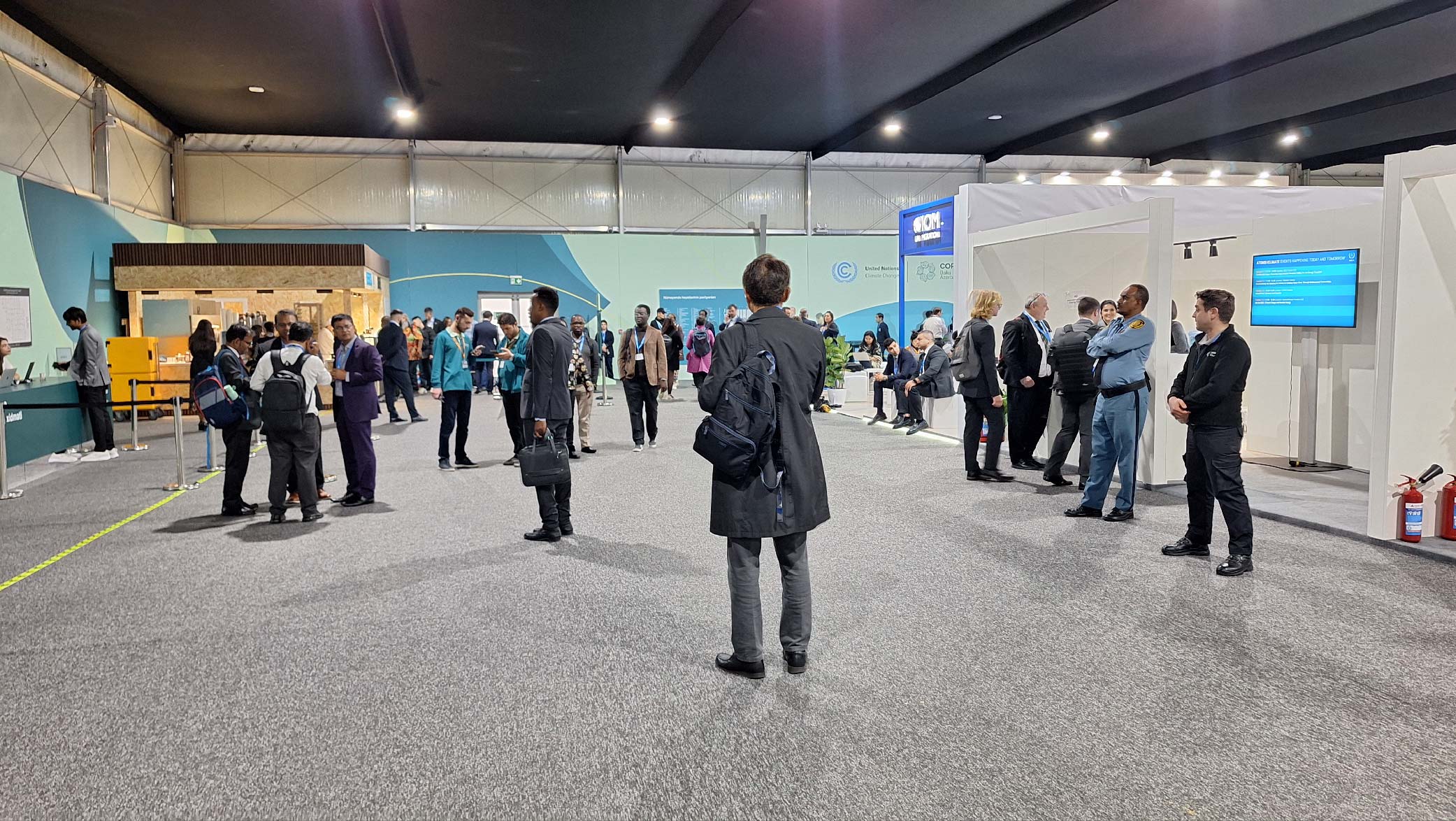 Climate financing at COP29 Climate financing at COP29 in Azerbaijan Baku
Climate financing at COP29 Climate financing at COP29 in Azerbaijan Baku
“The challenges are primarily domestic. The conflict has caused widespread destruction of infrastructure, the displacement of millions, economic and social deterioration, and ongoing security instability,” Adib al-Osta, environmental expert and engineer, told Raseef22. “These factors make it exceedingly difficult to implement climate projects, which require a stable environment to ensure their success and sustainability.
“The war has created a severe humanitarian crisis, leading the government and international organizations to focus their efforts and resources on meeting the population’s basic needs, such as food, shelter, and healthcare. This has delayed addressing climate change issues.”
He also highlights that some already funded projects are stalled, as parts of the Syrian government deem them non-essential, thus missing out on developmental opportunities. The Syrian environmental expert highlights a point similar to that of Aklan: the weakened infrastructure and government institutions caused by the war have impaired Syria's ability to develop and implement climate policies and projects. Additionally, the loss of expertise due to migration and displacement has left current officials overseeing environmental and climate projects in Syria without the necessary knowledge or skills.
A unique challenge that Syria faces is the impact of Western sanctions, according to Al-Osta. These sanctions hinder banking operations and financial transfers, making it difficult to receive funds from international donors except through organizations. All these internal obstacles are compounded by global issues, such as donor hesitancy due to the risks associated with investing in an unstable and high-risk environment like Syria. Furthermore, the competition for climate financing from developing nations with more stable environments makes these countries more appealing to donors, who prefer to allocate funds where projects are more likely to be executed effectively and yield tangible results.
“Stability and security are essential first steps to attract international financing, including climate funding,” al-Osta told Raseef22. “It is also necessary to build the capacity of national institutions to plan and implement climate projects efficiently and transparently. Collaborating with international organizations on small-scale projects can help communities adapt to climate change. Additionally, raising awareness of the importance and priority of climate issues at the national level, even amidst current crises, is critical.”
“With decades of ongoing conflicts, Iraq is far from being an environment conducive to investments in climate action. When the world embarked on the environmental pathway, Iraq was preoccupied with wars. Today, while climate action is relatively new to the country, the international community does not adequately accommodate this.”
There is also an urgent need to enhance the negotiating skills of delegations in order to secure greater climate financing. Al-Osta notes that obtaining more funding also depends on having qualified professionals capable of crafting projects that meet the standards required by donor funds—something Syria currently lacks. Developing a comprehensive national strategy for climate issues, including improving the legislative and financial environment, could create a genuine opportunity to bridge the technological and knowledge gaps between Syria and the rest of the world.
Biases in climate funding
To overcome some of these hurdles, various entities, including UN organizations, are working with the negotiating delegations to help them secure better opportunities during the climate conference negotiations. One such organization is the United Nations Development Program (UNDP) in Iraq, a country ranked as the fifth most affected by climate change globally. In an interview with Raseef22 from Iraq's pavilion at COP29, UNDP Resident Representative Auke Lootsma explained that “in many developing countries, the capacity to benefit from mechanisms like climate finance is limited. Many of these countries do not submit 'Nationally Determined Contributions' (NDCs)—action plans for reducing emissions and adapting to climate change—essential for accessing climate finance.”
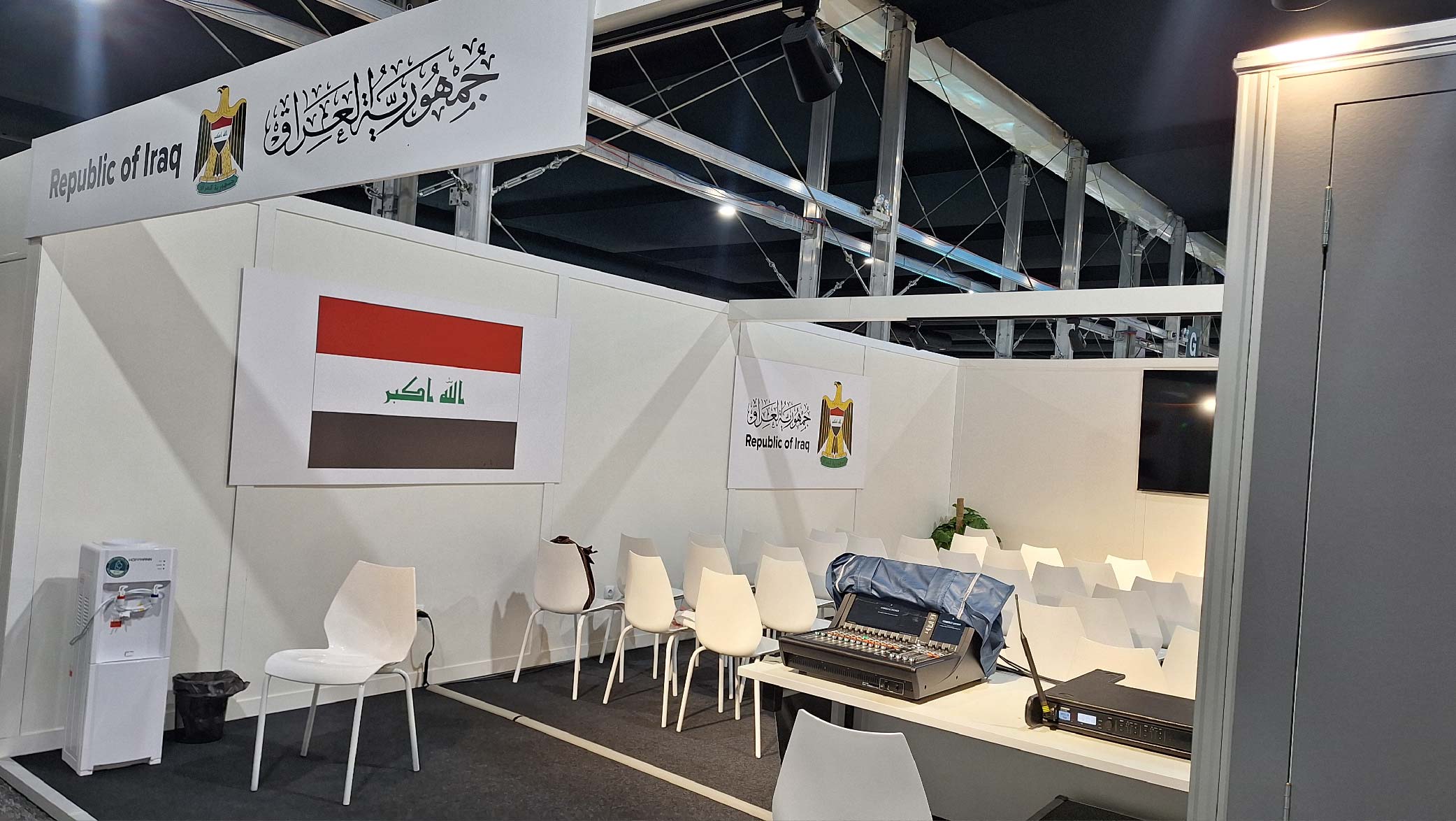 Iraqi flag at COP29 Climate financing at COP29
Iraqi flag at COP29 Climate financing at COP29
UNDP collaborates with several Iraqi ministries, including Environment, Water Resources, and Agriculture. Mamunur Rashid, UNDP’s lead on environment, energy, and climate change, has been tasked with training ministry delegations attending COP29. With extensive expertise from his home country, Bangladesh, Rashid notes that capacity building alone isn’t some magic solution. Iraq faces other challenges that hinder its access to climate finance, despite currently requesting $100 billion annually for this purpose.
“Stability and security are essential first steps to attract international financing, including climate funding. It is also necessary to build the capacity of national institutions to plan and implement climate projects efficiently and transparently."
“Iraq is perceived as a high polluter, even though much of the extracted oil is exported. It also suffers severely from water scarcity, a situation that is likely to worsen rapidly, leading to further rural-to-urban migration,” Rashid explained to Raseef22. “With decades of ongoing conflicts, Iraq is far from being an environment conducive to investments in climate action. When the world embarked on the environmental pathway, Iraq was preoccupied with wars. Today, while climate action is relatively new to the country, the international community does not adequately accommodate this.”
Rashid also noted that UNDP is working to foster a global platform that brings together countries affected by both conflicts and climate change, such as Iraq, Yemen, Somalia, and Mali. This initiative aims to facilitate communication, build knowledge, and underscore the role climate finance can play in mitigating conflicts. By diversifying economies, creating new job opportunities, and improving living conditions for millions, climate finance could provide a long-term solution, particularly in Iraq, which faces significant population growth.
For his part, Lootsma stressed the importance of such initiatives for countries recovering from prolonged conflicts. He highlighted how young people in these nations, especially those in Iraq, often face security risks like recruitment into armed groups. Lootsma also emphasized the importance of national accountability.
“You can certainly ask for funding, but you must demonstrate that you're doing your part—establishing a transparent, accountable mechanism to monitor progress. Iraq has the capacity, but it also needs political will, a better investment climate, comprehensive economic reform, and investments in renewable energy and the green economy. While the government has begun taking steps in this direction, it will take considerable time, especially with the emigration of skilled professionals. Iraq could also allocate some of its oil revenues to climate action, something we consistently advocate.”
“Iraq will raise its voice, but whether it will compel others to listen remains uncertain,” added Rashid.
These voices echoed across countries like Yemen, Syria, Iraq, and others. While contexts vary, the obstacles are strikingly similar. What unites them is the urgent need to lead the list of nations deserving of climate finance. This raises a persistent question: Will conflict-stricken countries in the region ever achieve their goals?
Note: This story was produced as part of the “Climate Change Media Partnership 2024” program, a journalism fellowship organized by the Earth Journalism Network, Internews, and the Stanley Center for Peace and Security.
Raseef22 is a not for profit entity. Our focus is on quality journalism. Every contribution to the NasRaseef membership goes directly towards journalism production. We stand independent, not accepting corporate sponsorships, sponsored content or political funding.
Support our mission to keep Raseef22 available to all readers by clicking here!
Interested in writing with us? Check our pitch process here!
